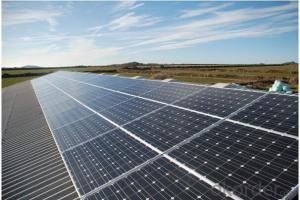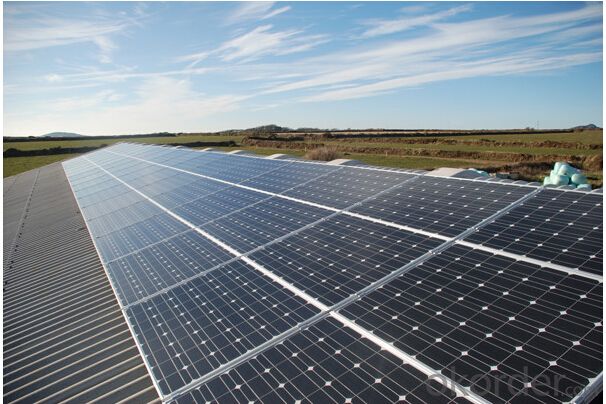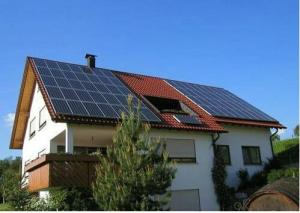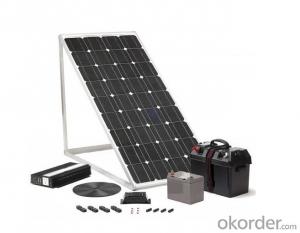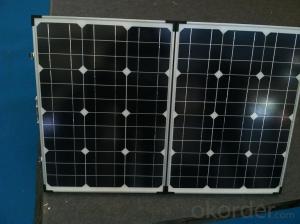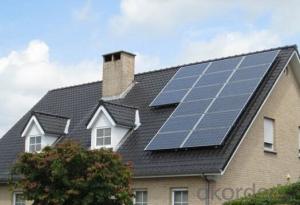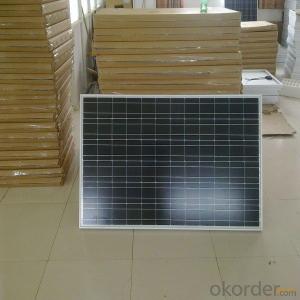Made in China 5W Photovoltaic Solar Energy System - Solar System
- Loading Port:
- China Main Port
- Payment Terms:
- TT OR LC
- Min Order Qty:
- -
- Supply Capability:
- -
OKorder Service Pledge
Quality Product, Order Online Tracking, Timely Delivery
OKorder Financial Service
Credit Rating, Credit Services, Credit Purchasing
You Might Also Like
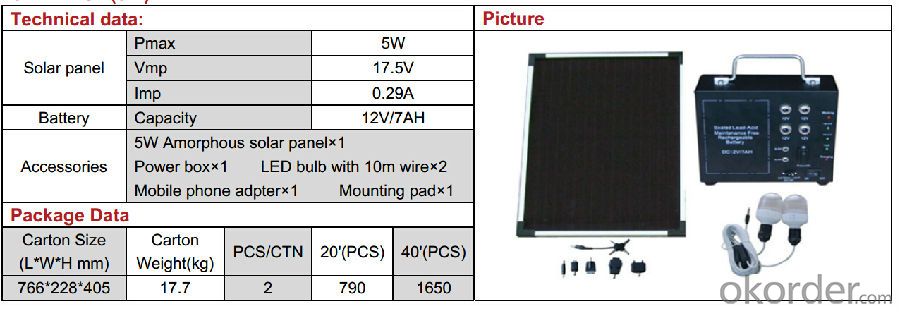
- Q: How do solar energy systems affect the resale value of a home?
- Solar energy systems can have a positive impact on the resale value of a home. Studies have shown that homes equipped with solar panels tend to sell faster and at a higher price compared to homes without them. This is because solar energy systems offer numerous benefits, such as reduced energy costs, potential tax incentives, and a smaller environmental footprint. Additionally, as renewable energy becomes increasingly popular, homes with solar panels are often seen as more desirable to buyers, making them a valuable investment.
- Q: What is the role of solar energy systems in reducing energy inequality?
- Solar energy systems play a crucial role in reducing energy inequality by providing access to affordable and sustainable energy sources for communities that are traditionally underserved or lack reliable access to electricity. One of the main advantages of solar energy systems is their scalability, which makes them suitable for both large-scale installations and small-scale community-based projects. This flexibility allows solar energy systems to be deployed in rural areas, where the grid infrastructure may be nonexistent or unreliable. By harnessing the power of the sun, these systems can provide electricity to homes, schools, and healthcare facilities, improving the quality of life for people in these communities and bridging the energy gap. Furthermore, solar energy systems can be installed on rooftops, reducing the need for additional land and minimizing the environmental impact. This is particularly important in urban areas where space is limited and traditional energy sources, such as coal or gas, may be more polluting and harmful to human health. Solar energy systems can help reduce air pollution and associated health issues, creating a cleaner and healthier environment for all. Another key aspect of solar energy systems is their potential for decentralized energy production. Instead of relying solely on large power plants located far away from communities, solar energy systems allow for distributed generation, meaning electricity can be produced and consumed locally. This decentralization empowers communities to take control of their energy production, reducing their dependence on centralized grids and often volatile energy prices. Solar energy systems also have the potential to create economic opportunities and reduce energy costs for marginalized communities. By investing in solar installations, communities can generate income through the sale of excess energy back to the grid, creating local jobs and promoting economic development. Additionally, solar energy systems can help lower energy bills for households, freeing up financial resources that can be allocated to other essential needs. In summary, solar energy systems play a critical role in reducing energy inequality by providing equitable access to affordable, sustainable, and clean energy sources. By addressing energy poverty and promoting self-sufficiency, solar energy systems contribute to a more inclusive and sustainable future for all.
- Q: Are there any limitations to the use of solar energy systems?
- Yes, there are limitations to the use of solar energy systems. Some common limitations include the intermittent nature of sunlight, which means solar power generation may be affected by weather conditions and variations in daylight hours. Additionally, the initial installation cost of solar systems can be expensive, although it is often offset by long-term savings. The efficiency of solar panels can also be affected by factors such as shading and dust accumulation. Finally, the storage and distribution of solar energy can be challenging, as it requires the use of batteries or connection to the grid.
- Q: Can solar energy systems be used for electric vehicle charging?
- Yes, solar energy systems can be used for electric vehicle charging. Solar panels can generate electricity from sunlight, which can then be used to charge electric vehicles. This renewable energy source is environmentally friendly and can reduce dependence on fossil fuels for transportation.
- Q: Can solar energy systems be used for powering electric car wash systems?
- Solar energy systems have the capability to operate electric car wash systems. Utilizing photovoltaic panels, solar energy systems convert sunlight into usable electricity. This electricity can then be employed to power a variety of electrical devices, such as car wash systems. By strategically placing solar panels on the roof of a car wash facility or a nearby structure, the generated solar power can be directly harnessed to operate the electric motors, pumps, and other necessary equipment for a car wash system. This not only diminishes the dependence on traditional grid electricity but also aids in reducing operational expenses and minimizing the carbon footprint of the car wash facility. Moreover, solar energy systems have the ability to store surplus energy in batteries, ensuring uninterrupted operation even during periods of limited sunlight or at night.
- Q: Can solar energy systems be used in military applications?
- Indeed, solar energy systems have the capability to be utilized in military applications. The adaptability and reliability of solar technology have been proven, rendering it an appealing choice for military operations. The military has acknowledged the advantages of solar energy systems in terms of lessening reliance on fossil fuels and heightening energy security in remote or unstable regions. The portability of solar energy systems in military applications is one of their primary benefits. Solar panels and related equipment can be effortlessly transported and deployed in various locations, supplying power for small-scale operations or even entire bases. This flexibility enables military units to function in off-grid or challenging environments where conventional energy sources may be scarce or undependable. Furthermore, solar energy systems can improve the sustainability and resilience of military operations. By generating renewable energy on-site, the military can decrease its carbon footprint and reduce dependence on vulnerable supply chains for fuel. Solar power can be combined with energy storage solutions to ensure uninterrupted power supply, even during grid failures or combat situations. Moreover, solar energy systems contribute to long-term cost savings. Although the initial investment may be greater compared to conventional energy sources, solar technology has become increasingly affordable. Over time, the operational and maintenance expenses of solar systems are significantly lower than those of conventional energy sources. This can lead to substantial savings for the military, permitting resources to be allocated to other critical areas. In addition to these benefits, solar energy systems also offer enhanced tactical advantages. Solar-powered equipment and devices can operate silently, minimizing the risk of detection by enemy forces. Furthermore, solar energy systems can reduce the logistical burden of transporting and storing traditional energy sources, enabling military units to be more agile and efficient in their operations. Overall, solar energy systems provide numerous advantages for military applications. The versatility, portability, sustainability, cost-effectiveness, and tactical benefits of the technology make it a valuable asset in enhancing military capabilities while reducing environmental impact and bolstering energy security.
- Q: How often do solar panels need to be cleaned?
- Solar panels generally need to be cleaned at least once or twice a year to ensure optimal performance. However, the frequency of cleaning can vary depending on factors such as the local climate, amount of dust or debris accumulation, and the tilt angle of the panels. Regular inspections and maintenance can help determine the specific cleaning needs of solar panels.
- Q: Can solar energy systems be used in cold storage facilities?
- Yes, solar energy systems can be used in cold storage facilities. Solar panels can generate electricity to power refrigeration systems and other equipment in cold storage facilities. Additionally, solar thermal systems can provide heat for defrosting purposes or to maintain optimal temperatures inside the facility. Implementing solar energy systems in cold storage facilities can help reduce operating costs and carbon emissions.
- Q: How do solar energy systems impact the electric grid?
- Solar energy systems have a significant impact on the electric grid by reducing the demand for electricity from traditional sources. As more solar power is generated and fed into the grid, it helps to stabilize the grid by diversifying the energy mix. Additionally, solar systems can reduce peak demand during daylight hours, leading to cost savings and less strain on the grid infrastructure. However, the intermittent nature of solar power can pose challenges in grid management, requiring grid operators to carefully balance supply and demand to ensure grid reliability.
- Q: Can solar energy systems be used in areas with saltwater exposure?
- Yes, solar energy systems can be used in areas with saltwater exposure. However, it is important to consider the potential corrosion effects of saltwater on the system's components. Proper maintenance and the use of corrosion-resistant materials can help mitigate these effects and ensure the longevity and efficiency of the solar energy system in such areas.
Send your message to us
Made in China 5W Photovoltaic Solar Energy System - Solar System
- Loading Port:
- China Main Port
- Payment Terms:
- TT OR LC
- Min Order Qty:
- -
- Supply Capability:
- -
OKorder Service Pledge
Quality Product, Order Online Tracking, Timely Delivery
OKorder Financial Service
Credit Rating, Credit Services, Credit Purchasing
Similar products
Hot products
Hot Searches
Related keywords
